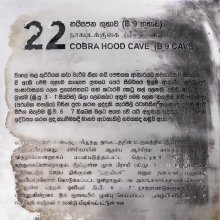Nayi, Nāyī: 3 definitions
Introduction:
Nayi means something in Buddhism, Pali, the history of ancient India, Tamil. If you want to know the exact meaning, history, etymology or English translation of this term then check out the descriptions on this page. Add your comment or reference to a book if you want to contribute to this summary article.
Images (photo gallery)
India history and geography
Source: Project Gutenberg: Castes and Tribes of Southern India, Volume 1Nayi (“dog”) is one of the exogamous septs (divisions) among the Kurubas (a tribe of South India). The Kurubas are sub-divided into clans or gumpus, each having a headman or guru called a gaudu, who gives his name to the clan. And the clans are again sub-divided into gotras or septs (viz., Nayi).

The history of India traces the identification of countries, villages, towns and other regions of India, as well as mythology, zoology, royal dynasties, rulers, tribes, local festivities and traditions and regional languages. Ancient India enjoyed religious freedom and encourages the path of Dharma, a concept common to Buddhism, Hinduism, and Jainism.
Languages of India and abroad
Pali-English dictionary
Source: BuddhaSasana: Concise Pali-English Dictionarynayi : (aor. of nayati) led; guided; conducted. (see neti.)

Pali is the language of the Tipiṭaka, which is the sacred canon of Theravāda Buddhism and contains much of the Buddha’s speech. Closeley related to Sanskrit, both languages are used interchangeably between religions.
Kannada-English dictionary
Source: Alar: Kannada-English corpusNāyi (ನಾಯಿ):—
1) [noun] a dog a) a domesticated canine (Canis familiaris), raised in many breeds which are commonly kept as house pets and also used for hunting, guarding people or property, etc.; b) any of various wild canines.
2) [noun] (fig.) a thing that deserves scorn; a despicable thing.
3) [noun] a mean, contemptible fellow.
4) [noun] ನಾಯ ತೇಜ [naya teja] nāya tēja that which brings infamy, disgrace, dishonour; ನಾಯ ಪಾಡು [naya padu] nāya pāḍu = ನಾಯಿ ಪಾಡು [nayi padu]; ನಾಯಿ ತಲೆಮೇಲಿನ ಬುತ್ತಿ [nayi talemelina butti] nāyi tale mēlina butti a thing which cannot be reasonably hoped to happen or sustain;a thing that may fall in to the hands of an unworthy person;ನಾಯಿ ಪಾಡು [nayi padu] nāyi pā'u a contemptible, abject condition of living; ನಾಯಿ ಬಾಲ [nayi bala] nāyi bāla a habit that can never be corrected; ನಾಯಿ ಬಾಲ ಡೊಂಕು [nayi bala domku] nāyi bāla ḍoṃku (a phrase meaning) a habit that can never be corrected; ನಾಯಿಗೆ ನೈವೇದ್ಯವಾಗು [nayige naivedyavagu] nāyige naïvēdyavu (a worthy thing) to fall into the hands of an totally undeserved or utterly despicable person; ಸಾಕಿದ ನಾಯಿ [sakida nayi] sākida nāyi a faithful, loyal person (often used in ridiculing manner); ನಾಯಿಗೆ ಕೆಲಸವಿಲ್ಲ, ಕೂಡಲಿಕ್ಕೆ ಸಮಯವಿಲ್ಲ [nayige kelasavilla, kudalikke samayavilla] nāyige kelasavilla, kūḍalikke samayavilla some are always busy but they never do anything; ನಾಯಿ ಬಾಲ ನಳಿಗೇಲಿ ಹಾಕಿದರೆ ಡೊಂಕು ಬಿಟ್ಟೀತೆ [nayi bala naligeli hakidare domku bittite]? nāyi bāla naḷigēli hākidare ḍoṃku biṭṭīte? human perversion can never be set right by advice; ನಾಯಿ ಬೊಗಳಿದರೆ ದೇವಲೋಕ ಹಾಳೆ [nayi bogalidare devaloka hale] nāyi bogaḷidare dēvalōka hāḷe? the moon does not heed the barking of dogs.
Kannada is a Dravidian language (as opposed to the Indo-European language family) mainly spoken in the southwestern region of India.
See also (Relevant definitions)
Starts with (+90): Nayi-baela, Nayi-kabbu, Nayi-kote, Nayi-nerile, Nayi-tekkake, Nayi-velai, Nayia, Nayib, Nayibaduku, Nayibala, Nayibalu, Nayibel, Nayibela, Nayibelegida, Nayibeli, Nayibemde, Nayibetta, Nayibi, Nayibite, Nayibullal.
Ends with (+31): Agnayi, Anunayi, Apinayi, Asnayin, Ayutanayi, Bannamgayi, Betenayi, Celen-celenayi, Cennanayi, Cinayi, Cinnayi, Cunayi, Doddanayi, Hidinayi, Huccunayi, Julnayi, Julunayi, Kadavinayi, Kadunayi, Kalnayi.
Full-text (+11): Naim-naim, Naim, Ippane, Oppane, Kedugala, Nayi-velai, Piziaa nayi castilla, Bihuii nayi xtilla, Pehuij nayi castilla, Nay, Biziaa nayi xtilla, Cicana gueto nayi castilla, Cennay, Nayi-kote, Nayi-tekkake, Nayitulasi, Nayineril, Anunay, Nayi-nerile, Nayi-kabbu.
Relevant text
Search found 18 books and stories containing Nayi, Nāyi, Nāyī, Nāy-ī, Nay-i, Naayee; (plurals include: Nayis, Nāyis, Nāyīs, īs, is, Naayees). You can also click to the full overview containing English textual excerpts. Below are direct links for the most relevant articles:
The War Comes < [July – September 1972]
Post – Modern Literature < [October – December, 2004]
Songs of a Sadhu < [July-August 1931]
Jainism and Patanjali Yoga (Comparative Study) (by Deepak bagadia)
Part 5.5 - Availability of Jain scriptures < [Chapter 3 - Jain Philosophy and Practice]
List of Mahabharata people and places (by Laxman Burdak)
Jnaneshwari (Bhavartha Dipika) (by Ramchandra Keshav Bhagwat)
Ramayana of Valmiki (by Hari Prasad Shastri)
Chapter 89 - The Birth of Pururavas < [Book 7 - Uttara-kanda]
Chapter 28 - Sita’s Lament < [Book 5 - Sundara-kanda]
Chapter 60 - King Trishanku ascends to a specially created heaven < [Book 1 - Bala-kanda]
Harivamsha Purana (by Manmatha Nath Dutt)
Chapter 124 - Krishna’s Battle with Jvara (fever) < [Book 2 - Vishnu Parva]
